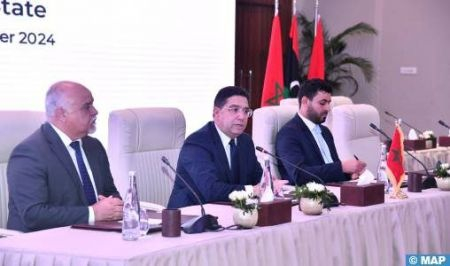Libyan Crisis: Moroccan FM Calls for Renewed Commitment to ‘Spirit of Skhirat’
Morocco’s Minister of Foreign Affairs, African Cooperation, and Moroccan Expatriates, Nasser Bourita, emphasized, on Wednesday in Bouznika, the urgent need to embrace the “spirit” of the Skhirat Agreement to achieve a solution to the Libyan issue. “We need the spirit of Skhirat now more than ever as the Libyan file navigates this critical phase,” stated Bourita at the opening of a two-day consultative meeting between Libya’s House of Representatives and the High Council of State, attended by over 60 members from both institutions. In this regard, he explained that “this spirit, which allowed Libyans to prove to the world their ability, determination, and vision to overcome their country’s challenges, is exactly what both Libya and the international community urgently need,” while expressing his hope that this spirit will guide the next phases of the process. The minister highlighted that the Skhirat Agreement, signed on December 17, 2015, has been a cornerstone for Libyans, providing a critical framework that brought a degree of stability, established international interlocutors, and created institutions such as the Libyan House of Representatives and the High Council of State. These institutions, he noted, remain “crucial pillars” for advancing any meaningful progress in resolving the Libyan crisis. Commenting on the selection of Bouznika as the venue for this consultative meeting, Bourita remarked that Morocco considers it a symbol of the enduring trust and genuine brotherhood shared between the two nations and their peoples, noting that it reflects the Libyans’ confidence in holding their discussions in the Kingdom, a testament to Morocco’s approach, which is guided by the High Directives of His Majesty King Mohammed VI concerning the Libyan dossier. He emphasized that this approach is firmly grounded in the principles of non-interference, respect for the will of the Libyan people and their institutions, and unwavering support for the choices made by legitimate Libyan institutions in their efforts to resolve the country’s crisis. The minister underscored that Morocco’s position, under the leadership of His Majesty the King, remains unwavering and consistent, regardless of changing events and contexts. “We stand resolutely with Libya, recognizing that its stability and unity are inseparably linked to our own. The solution will always rest in the hands of the Libyans themselves, with no externally imposed outcomes,” he declared. He further emphasized that Morocco offers Libyans a neutral platform for dialogue, without advocating any specific stance, proposal, or initiative. This effort reflects Morocco’s commitment to honoring the Libyan parties’ desire for a pressure-free space where they can engage in meaningful dialogue and consultation. This meeting takes place in a complex context marked by significant transformations and rapidly unfolding events in the Arab region, as well as external interference in Arab affairs. Such a situation, Bourita emphasized, calls on Libyans to safeguard the unity and territorial integrity of their country during this delicate phase for the region. It also unfolds amid a growing desire to inject new momentum into the Libyan dossier, whether through the efforts of the UN mission or other stakeholders, Bourita noted, adding that today’s meeting presents an opportunity for Libya’s two legitimate institutions to align their visions and engage with these developments. “There is an urgent need for a national unity government in Libya—one capable of addressing Libyans’ aspirations for economic and social development, ensuring stability, and preparing credible elections to resolve the issue of institutional duplicity,” he underlined, stressing that the international community requires such a government to support Libyans’ ambitions, both on domestic and international fronts. “The numerous regional and international conferences on Libya can never replace inter-Libyan dialogues, which are the only solutions that carry legitimacy and local ownership,” Bourita affirmed, reiterating that Morocco has always maintained these dialogues must take place free from external interference or pressure. He concluded by describing this consultative meeting as “essential and encouraging,” expressing hope that it will serve as a starting point for revitalizing the Libyan peace process. “The solution to the Libyan crisis lies solely in the hands of the Libyans,” he stressed. In line with the High Directives of His Majesty King Mohammed VI, Morocco hosted a series of inter-Libyan dialogue sessions in Skhirat in December 2015, culminating in the “Skhirat Agreement,” a landmark step toward resolving the Libyan crisis. This agreement led to the formation of a Presidential Council for the Government of National Unity, the establishment of mechanisms to unify state institutions, and the organization of elections aimed at completing the construction of state institutions. It also ensured Libya’s sovereignty and territorial integrity while meeting the Libyan people’s aspirations for progress, prosperity, and development.

